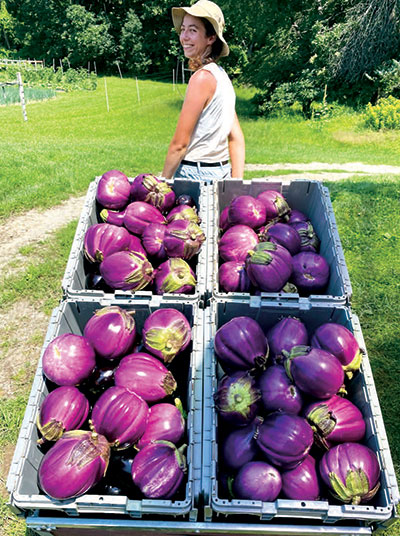By Ella Schwarzbaum, Assistant Farmer
The farm season is now well underway! When I talk to friends and family about what we are growing at the farm, someone is always bound to ask if we grow organically.

When most people think of the word organic, they think of the movement that started in the 1960s and 70s to lessen the global dependence on synthetic pesticides and fertilizers. Using a mix of historical knowledge and innovations, farmers worked out systems to keep their fields weed and pest free while growing food. Over time, these systems and informal decisions became codified into a legal standard, giving rise to today’s “certified organic.” The organic bar has many components and can hopefully help customers make more informed choices based on how their food was grown.
So, is organic food healthier than non-certified organic? Not necessarily. A food’s nutrition will vary depending on how it is grown, and synthetic sprays are just one aspect. A farmer doesn’t just put seeds in the ground; we also care for the soil, water and wildlife around us.
While Sisters Hill Farm is not organic certified, we try to hold ourselves to an even higher standard! We’re confident that we grow food in a way that not only produces the tastiest, healthiest produce for our farm members but also nurtures the earth. Fundamentally, food gets its nutrition from the soil it is grown in, so that is our first step. We have two main ways that we work to be sure our soil is healthy enough to produce the best quality vegetables.
The first step is to foster diversity. Every plant takes up and releases different amounts of nutrients into the soil. By growing a diverse mix of vegetables, we ensure no one nutrient is excessively drained from the soil. The second strategy is to rotate our crops. For example, if we grew onions in a field in 2019, we would not plant onions there again until 2022 or later. We have ten fields on the farm and ensure that no type of crop is planted in the same field within three years. This rotation allows us to return the leaves and roots to the soil, recycling valuable nutrients without worrying about pests that may damage similar crops the following year.
Whether or not to buy organic is a big, complicated issue with many variables. At the end of the day, if you’re buying produce in the supermarket, organic is probably your best bet. A farm large enough to provide produce to a chain store probably will not put the same focus on land stewardship and natural soil nutrition that a small farm may. Even with that being the case, the organic produce will at least have been grown without synthetic pesticides or fertilizers. If you’re buying your food from a local farm stand, farmers market or CSA, however, feel free to look past the label and talk to the farmer directly. Perhaps the certification paperwork is too time-consuming, or the filing fees are too high. What matters most is how the food was grown. Talking with your local farmer is the best way to ensure you’re getting the most nutritious produce for yourself and your family.
